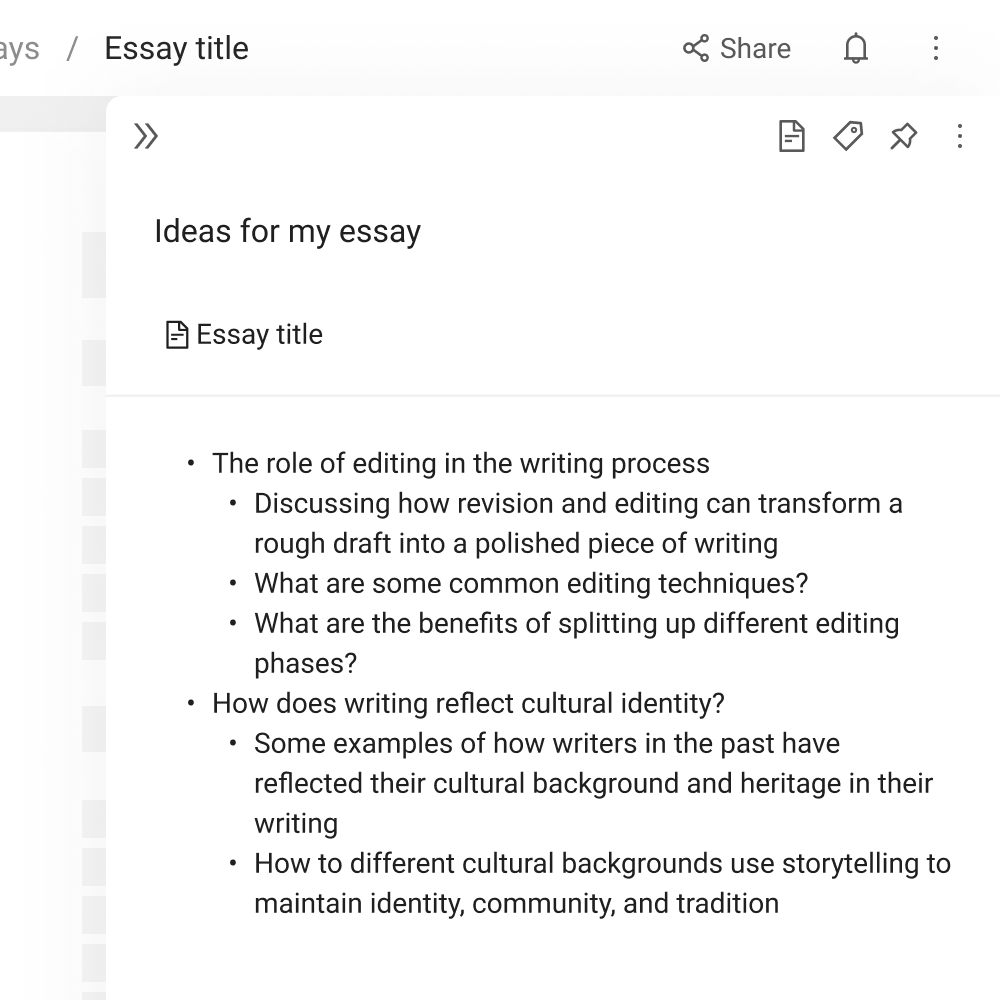Take your rough ideas and craft them into powerful proposalsarticles
Essay provides a structured writing environment, designed to help writers of all levels to find a topic of interest, organize their thoughts, improve their ideas, and communicate more effectively.

Organize your research with Notes, plan your project with Outline, and structure your ideas with ease. Essay incorporates unique tools that allow you to connect your notes and research to your outline, making it easy to generate ideas and get a rough draft completed.

Organize your research with Notes, plan your project with Outline, and structure your ideas with ease. Essay incorporates unique tools that allow you to connect your notes and research to your outline, making it easy to generate ideas and get a rough draft completed.
Essay uses the structured writing method developed by author, professor & clinical psychologist Dr. Jordan B. Peterson.
See the story behind Essay:
Create a skeleton and structure for your essay.
A distraction-free writing environment.
Play and experiment with word choice & sentence structure.
Evaluate every element of your work to make sure your argument flows well.
Use Notes to quickly jot down ideas, collect research, and organize your thoughts.
Share your work with friends, teachers, or peers to get meaningful feedback.
Save for later allows you to remove an idea from your document, and save it in a note for later.

The Topic Tool helps you find the questions you want answered, and the direction that you want to explore.
See how we compare with some other popular writing tools:




Designed to strengthen your writing and communication skills.
Provides a clear philosophy and process to follow.
Encourages play, experimentation, creativity and critical thinking.
Offers specialized tools that build strong editing habits while simplifying the process of refining your writing.
Retains sentence level edit history, ensuring you never lose a good idea.
Effective feedback tools so writers receive the insights they need to improve their writing.

Conventional word processor that supports collaborative work.
No specific tools to help you edit, organize, or develop your ideas
Difficult to manage feedback due to limited sorting and filtering options for comments
Focused on formatting rather than idea generation and refinement.
Legacy writing platform with slow-paced feature rollout, less responsive to user feedback
Perfect for those who have an existing process and don't need structure or guidance while writing.

Specialist writing platform focused on supporting large writing projects.
Complex interface with a steep learning curve
May require longer setup due to numerous customization options
Particularly effective for experienced writers working on large projects
Ideal for writing projects that don’t require peer review or structured editing
Complicated multi-device syncing

Popular autocorrect extension, focused on correcting grammar and phrasing.
Focused on quickly improving and shaping the final product, but not on the process.
Suggests edit that are not consistent with your voice or writing style
Does not help you avoid mistakes in the future, and creates dependence on the tool
Overemphasizes certain rules, making writing feel robotic.
Struggles with nuanced or creative writing.





Designed to strengthen your writing and communication skills.
Provides a clear philosophy and process to follow.
Encourages play, experimentation, creativity and critical thinking.
Offers specialized tools that build strong editing habits while simplifying the process of refining your writing.
Retains sentence level edit history, ensuring you never lose a good idea.
Effective feedback tools so writers receive the insights they need to improve their writing.

Designed to strengthen your writing and communication skills.
Provides a clear philosophy and process to follow.
Encourages play, experimentation, creativity and critical thinking.
Offers specialized tools that build strong editing habits while simplifying the process of refining your writing.
Retains sentence level edit history, ensuring you never lose a good idea.
Effective feedback tools so writers receive the insights they need to improve their writing.

Conventional word processor that supports collaborative work.
No specific tools to help you edit, organize, or develop your ideas
Difficult to manage feedback due to limited sorting and filtering options for comments
Focused on formatting rather than idea generation and refinement.
Legacy writing platform with slow-paced feature rollout, less responsive to user feedback
Perfect for those who have an existing process and don't need structure or guidance while writing.

Specialist writing platform focused on supporting large writing projects.
Complex interface with a steep learning curve
May require longer setup due to numerous customization options
Particularly effective for experienced writers working on large projects
Ideal for writing projects that don’t require peer review or structured editing
Complicated multi-device syncing

Popular autocorrect extension, focused on correcting grammar and phrasing.
Focused on quickly improving and shaping the final product, but not on the process.
Suggests edit that are not consistent with your voice or writing style
Does not help you avoid mistakes in the future, and creates dependence on the tool
Overemphasizes certain rules, making writing feel robotic.
Struggles with nuanced or creative writing.
While teaching at Harvard and the University of Toronto, Dr Jordan B Peterson found that even his best students were struggling with writing.
He created a writing guide that reinforced the importance of engaging meaningfully with a topic that matters. The guide detailed a specific process for structuring your ideas and communicating them effectively.
Upon sharing this guide with his students they produced the best essay that they had ever written. It has continued to help writers develop their ideas for over 25 years and laid the foundation for our work at Essay.
Give Essay a try today with our 14-day free trial - no credit card required!